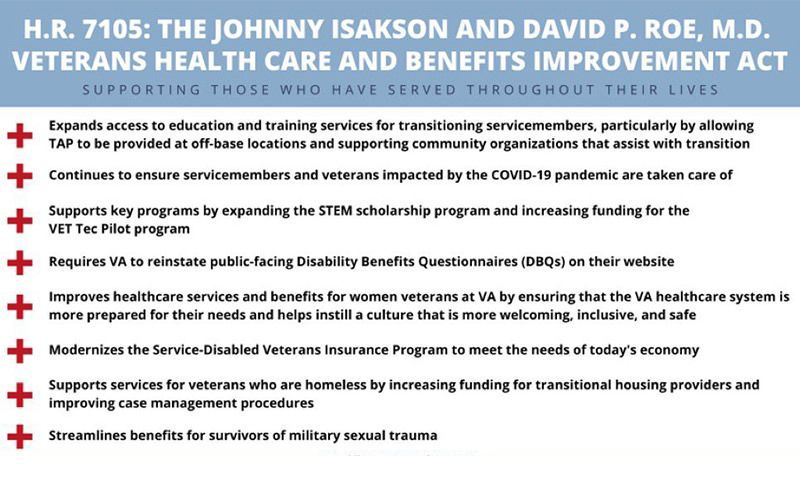
One of bill’s most notable provisions is the Deborah Sampson Act, which paves the way to improving care for women veterans within the Veterans Health Administration.
On Jan. 5, President Trump signed into law H.R. 7105, the “Johnny Isakson and David P. Roe, M.D. Veterans Health Care and Benefits Improvements Act of 2020,” which was passed by Congress in late December.
“This is the culmination of two years of bipartisan work,” said Rep. Phil Roe, R-Tenn. “There is something in this bill for just about every one of our nation’s veterans and their loved ones.”
The Deborah Sampson Act
One of the bill’s most notable provisions is the Deborah Sampson Act, which paves the way to improving care for women veterans within the Veterans Health Administration (VHA). The act will establish an Office of Women’s Health within VHA to oversee women’s health programs. The office will be responsible for ensuring standards of care for women veterans are being met by the VHA. The bill mandates that every Department of Veterans Affairs (VA) health-care facility has a women’s health primary care provider.
Despite being the fastest growing veteran demographic, women still face significant barriers when it comes to receiving care through the VHA. The American Legion has advocated and testified in multiple forums for the improvement of care for women veterans and it remains one of the Legion’s legislative priorities.
The Deborah Sampson Act also calls for:
-
Increasing cultural competency among VA staff
-
Expanding VA Military Sexual Trauma counseling
-
Requiring the Veterans Benefits Administration to process Military Sexual Trauma claims by specialized teams and allowing veterans choice in the gender of a medical provider if they are a victim of such trauma
Education
Education reforms included in the omnibus bill address the impact the COVID-19 pandemic is having on student veterans. The Secretary of VA will have the authority to continue to pay benefits to veterans impacted by the pandemic and allow them to preserve entitlement to benefits when they are unable to complete courses as a result of the pandemic.
The bill also makes changes to a number of VA education programs, including allowing STEM scholarships for clinical health training programs and allowing Yellow Ribbon Program participation by foreign schools.
Changes for Vietnam veterans
The bill will amend title 38, U.S.C., to revise the definition of the Vietnam era as beginning on Nov. 1, 1955, instead of Feb. 28, 1961. The American Legion supports this change through Resolution No. 8: Department of Veterans Affairs Revise the Definition of “Vietnam Era.”
Health care
Improvements in coordination for servicemembers and veterans exposed to burn pits who contract a virus as part of a pandemic are also included, as well as the expansion of provider eligibility for the Veteran Directed Care program. Subtitles within this section will exempt Indian and Urban Indian veterans from VA copays and improves reporting from state veterans homes and expands state veterans homes grants to tribal organizations.
It also requires state veterans homes to provide VA with recurring reports on COVID-19 cases and related issues within the facility, which is in line with the Center for Medicare and Medicaid Services COVID-19 reporting regulation.
Additionally, the bill requires the continuation of VA’s Women’s Health Transition Training Pilot Program to promote enrollment of women veterans in VA health care. Women veterans often leave service unaware of the health-care benefits they’ve earned. Led by a woman veteran who uses VA health care, the program is designed to complement the existing Transition Assistance Program by providing servicewomen training and information on women-centric issues, such as VA’s whole-health approach to women’s health care, services available to women veterans and how to enroll in VA health care. Ultimately, the goal of the program is to encourage more women to see that there is a place for them in the VA health-care system by educating them on the services that VA has to offer.
“I’m proud that one of my last votes of Congress will be in support of this bill, and I’m also humbled it bears my name and that of my friend,” Roe said. “Helping to serve my fellow veterans in Congress these past 12 years has been the honor of a lifetime.”
- Legislative

